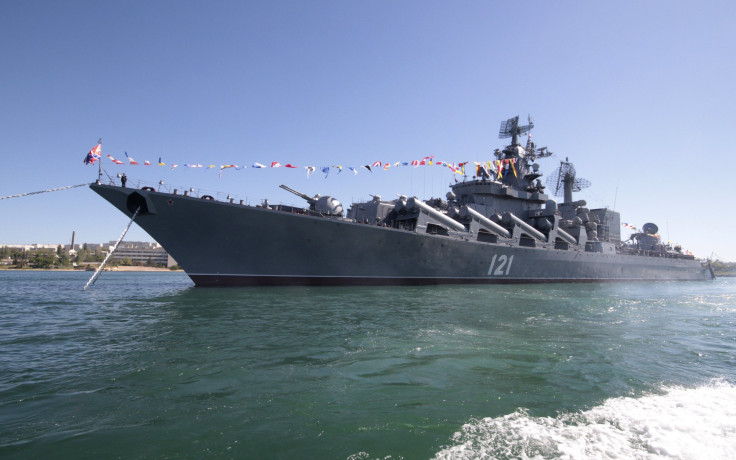Russian Missile Cruiser To Hold Fire Drills In South China Sea Ahead Of Putin's Visit To Beijing

The Russian missile cruiser Moscow, also known as Moskva, will hold drills on air defense and the use of “rocket, artillery and torpedo weapons” in a rare visit to the South China Sea, the Russian defense ministry announced Wednesday in a statement. The training exercises will also include practicing damage control tasks, according to the statement.
Moscow, an 11,500-ton cruiser, left Singapore after a short port call to conduct the drills in an unspecified area of the South China Sea. The Russian missile cruiser, which was launched in 1979 and commissioned in 1983, left a Russian naval base in Sevastapol, Crimea, on Sept. 6, and made port calls in the Greek ports of Corfu, Lefkada, Zakynthos and Argostalion. In mid-October, the Moscow crossed the Suez Canal into the Red Sea on its way to the port of Colombo in Sri Lanka, where it docked on Sept. 23.
Moscow’s rare fire drills in the South China Sea will be followed by a visit from Russian President Vladimir Putin to Beijing this month. During his visit, Putin, who was named the world’s most powerful person by Forbes in a report Wednesday, is expected to sign a bilateral cybersecurity agreement with China, the United States Naval Institute, or USNI, said in a report, adding that it is unclear if the deployment of the Moscow to the South China Sea and Putin’s Beijing trip are connected.
“That area of the South China Sea hasn’t been a core Russian operating area but it’s part of this expanded push from Russia that we’re seeing,” USNI quoted Eric Wertheim, an American naval expert, as saying. Wertheim believes that the Moscow’s deployment is a rare show of surface presence in the region by Russia.
Over the past year, Russia's military operations have had an increased focus on its aviation and submarine fleets rather than its surface fleets, the USNI report said, citing U.S. Chief of Naval Operations Admiral Jonathan Greenert.
On Wednesday, Russia successfully test-fired an intercontinental missile from a submerged Northern Fleet nuclear submarine from the Barents Sea to the Kura Range on the Kamchatka Peninsula in the country's far east. This is the second such test of a missile by Russia in a week after it successfully tested a new intercontinental ballistic missile on Oct. 29.
© Copyright IBTimes 2025. All rights reserved.






















